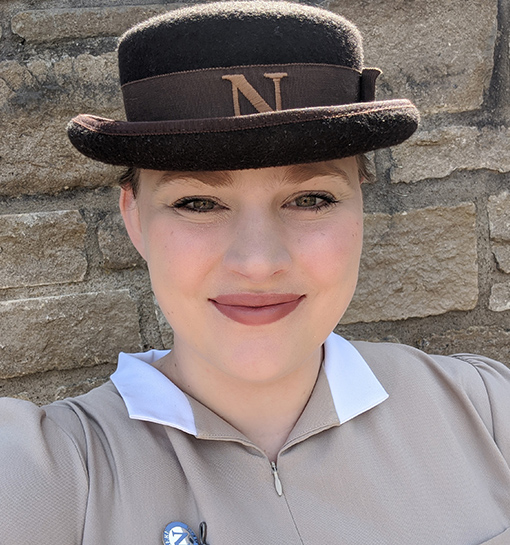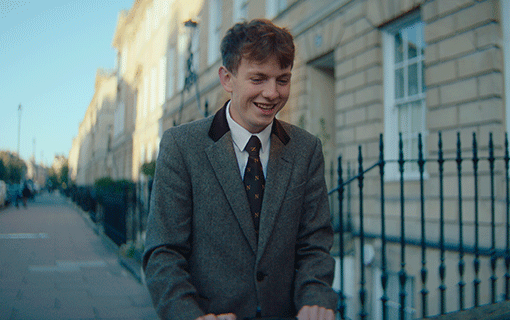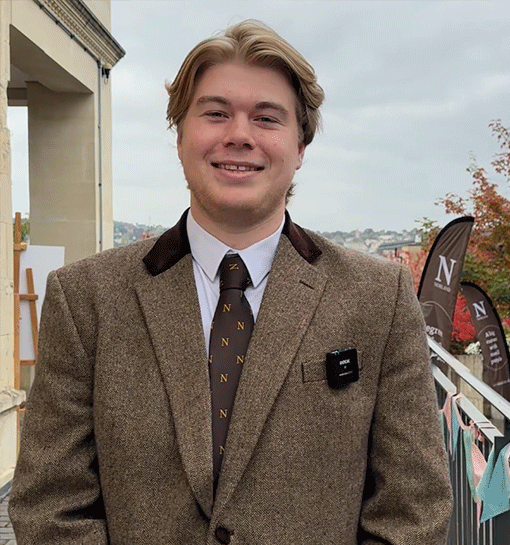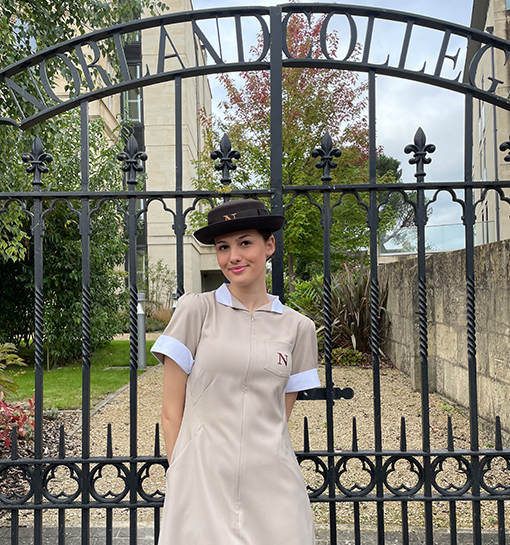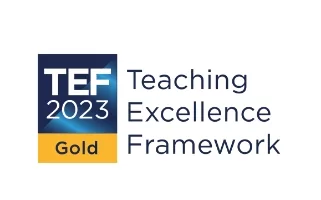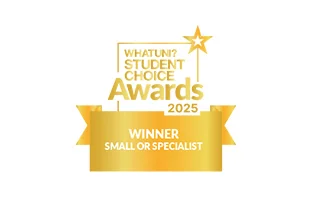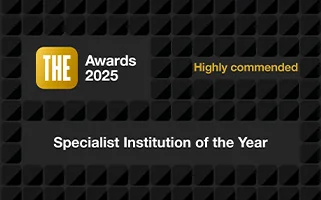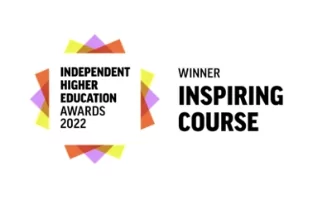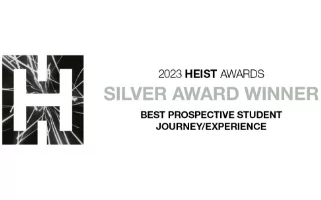Third-year students share their early childhood research topics for their Work Based Projects
30 April 2025
In their third year of early childhood degree studies, our students undertake research on a topic of their choice within the early years.
This project allows students to personalise their studies bringing together all they have learned by choosing a topic they’re passionate about or have identified as under-researched, producing a literature review, collecting data while on placement and writing a dissertation based on their findings. This research forms the Work Based Project module.
This year, Work Based Project topics vary from children’s clothing, children’s sleep, children who speak English as an additional language and sibling relationships.
We spoke to third-year students, asking them to share the title of their project and why they chose to research it.
Watch our recent webinar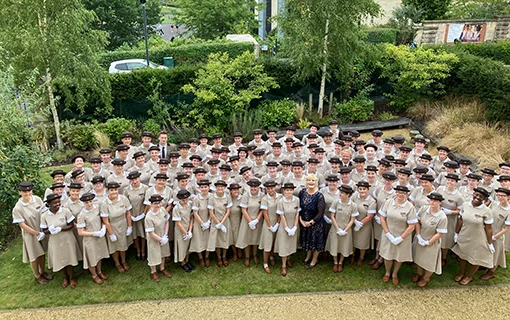
Elizabeth: What is happiness? A child’s perspective.
“My research is about happiness from the perspective of one child. The aim is to find out what the child defines happiness as and what they think might make other people happy.
“I’m researching this topic because there isn’t much previous research on happiness in children using child-led research. Therefore, I want to create a piece of research that truly captures the child’s voice and values their opinion.”
Bethan: Parental and child perceptions on internal and external influences on clothing choices.
“My project is about the choices that parents and children make around clothing choices, what influences these and where these influences come from.
“The nanny’s choice of clothing that they dress children in is a daily micro challenge. Nannies need to ensure that the clothes are appropriate, dressed to meet the preferences of the parent and not inconvenient if the child needs to remove or add clothing throughout the day.
“I chose this topic because I want to learn about how parents are influenced by social, economic and/or cultural factors, how children are influenced by siblings, peer groups, television, advertising, internet, parents and family members. I also wanted to research why and how the clothing choices parents make create traditions.”
Grace: A mother’s thoughts, feelings and experiences of her child’s sleep.
“My project is about a mother’s/parental perspective of children’s sleep, specifically looking at parents’ experiences of sleep and the support they may have received.
“I chose this research topic for as I’ve witnessed many parents struggle to manage their children’s sleep. I want to explore the support available for parents and the experiences they may have.”
Laura: The unique challenges faced by children with English as an additional language who are learning to read.
“My project explores the potential challenges faced by children with English as an additional language when developing their English reading. I also want to find out about the tools early years practitioners use to support children with English as an additional language to overcome any unique challenges.
“I’m researching this area as it’s one I’m passionate about. When working in education, it’s likely that you’ll come across children with English as an additional language. Therefore, knowing tools to best support development will support the development of both yourself as an early years practitioner as well as the child.”
Beth: Best of both worlds? How do the differences between the parents’ culture and children’s host culture affect parental practices in a Third Culture Kid’s Early Years?
“For my Work Based Project, I’ll be exploring if, and how, cultural dissonance between the parents’ home culture and the culture the child is raised in can affect the parents’ values and expectations when raising their children.
“As a third culture kid myself (my parents are English and raised me in Hong Kong), I’m really interested in what that means and how it has impacted my upbringing and shaped who I am and my values. There’s a lot of research on children themselves but there’s little on parents, other than how to help children. With the two cultures I was raised with being so different, I was interested in how my parents managed to navigate the differences and why they chose the values they did when raising me, and how other parents and cultures do this too.”
Lucy: Parents’ perspectives of the impact forest school has on children’s personal social and emotional development.
“My project is about how forest school can influence children’s development and how parents value it.
“I’ve chosen this research topic because I’ve worked part time at a local forest school for the past five years and have a love for being in the outdoors fostered by my involvement in the scouting movement.”
Lily: The parents’ perspective of children building resilience through participation in team sports.
“My research is about how participation in team sports from an early age can impact children when they’re young and when they grow up. It will also explore where parents’ perspectives of team sports come from and how this influences their child’s participation.
“I’m really interested in this topic as I played team sports from an early age. I feel it was very beneficial for me and has impacted the person I am today. I’m very grateful for the opportunities I had growing up and believe every child should have these too.”
Evie: The parental perspective of using Augmentative Alternative Communication in the home environment.
“My project explores the parental perspective of using Augmentative Alternative Communication (AAC) in the home environment. AAC are forms of communication aids that support children who face communication barriers. I’m exploring the parental perspective and their views regarding funding AAC, different types and barriers they may have faced with implementation alongside the benefits they have found by using it.
“This topic is important to me as I’ve worked with a child using AAC for the past five years. I’ve witnessed the effects of AAC and both the benefits and the struggles the family have faced. It has been fascinating exploring previous pieces of research surrounding this topic to help build my understanding.”
Jess: Parental perceptions of pharmacological and behavioural interventions to address sleep disturbances in children with autistic spectrum conditions.
“My project gains real life opinions from parents about the efficacy of certain sleep interventions and the perceptions of the best ones to help autistic children sleep better and longer, as over 80% of autistic children suffer from sleep disturbances. I examine all types of interventions with parents, from melatonin to weighted blankets.
“As someone who is autistic and has personal experiences of sleep problems as a child, I want to use my findings to help other people on the spectrum. Also I am researching this topic because I have an interest in supporting sleep and specialise in nannying for children with special educational needs and disabilities (SEND).”
Fern: Parental perceptions of the management of their child’s hearing loss: the role of the nanny in supporting children and families.
“I’m looking into the potential impact hearing loss has on the parents and family of a child, establishing where a nanny would be able to provide and offer support.
“Having personal experience of hearing loss, I’m keen to find out what parents’ views are on how they manage their child’s hearing loss and the impact of the hearing loss on their family. Furthermore, I want to find out how and where a nanny can offer and provide support to their charges and their family.”
Olivia: The role of the nanny in supporting children and their families through significant transitions.
“My research is about the strategies a nanny can use to facilitate smoother transitions and whether a nanny has a positive effect on supporting families through them.
“I’m researching this topic because I really loved watching children transition from the baby room to the toddler room on one of my placements at Norland. I loved researching ways I could make the transition easier, for example reading books or move-up taster sessions.”
Amy: Parental perspectives on Relationship & Sex Education (RSE) within the home environment.
“My project looks at the views parents have when it comes to teaching their children RSE. In the early years, this relates to building healthy friendships, teaching them about consent and bad secrets, personal hygiene, and teaching them how to be kind and respectful members of society.
“This topic has always interested me. Since our guest lecture with Alice Hoyle on relationships, sex education and children’s bodies, it sparked my interest even further. RSE is a taboo subject for a lot of parents, but it’s a vital topic to have with your children as it could protect them from harm or at least give them the knowledge to know when something isn’t right.”
Olly: Understanding sibling relationships: A mother’s view on sibling identity and individuality in the home.
“My project is about sibling relationships. It also will focus on a parental view on how they see each of their children as individual beings within the dynamic of siblings in the home environment.
“I chose to research this topic, not only because of my own experience of being a sibling with an older sister, but also because watching sibling interactions and relationships develop on my placements and in my work fascinates me. It’s something I’ve been eager to explore more since starting my studies at Norland.”
Olivia: The role of the nanny: fostering meaningful interactions between children with SEND and their siblings.
“I’m researching parental perspectives of meaningful interactions between their children with one of the children having special educational needs and disabilities (SEND). I want to research how they think a nanny can support and encourage meaningful interactions in this context.
“The family I’ve been working with for a year and a half have three lovely children and one of them has SEND. The child with SEND is non-verbal and had development delay. It’s been amazing and interesting to watch how the children interact with one another. Working with children with additional needs is something I feel really passionate about!”
Samuel: ‘Am I a twin, or are we twins?’ A dive into twin identity through outdoor play and intra-action’.
“My research looks at how twins experience identity and agency when playing outside and the influences of the outdoor environment. I am drawing on my experience of being a twin and using the posthumanist concept of intra-action to explore the expression of identity and agency.
“Growing up as a twin, I’ve always felt a strong connection to my brother. Playing and exploring outdoors together always felt like a particular point of connection where we would create play narratives together and utilise our shared interest and love of being in nature.”
Rose: Reducing the stigma around maternal guilt
“I’m researching the motherhood experience, exploring any stigmas, expectations, experiences and support available.
“I grew up with a mother who was very open about how she felt guilty in decisions she made in raising my brother and me. These included returning to work after our births, not breast feeding and childcare choices. While working, I have seen that many parents experience this. I want to explore why mothers feel guilty, what is the guilt connected to and what support is in place for mothers.”
Holly: A girl’s interpretation of the self through expressive dialogue
“For my project, I asked children questions to discover what features in a child’s description of the self. These included how they know what they’re feeling and if they had to choose three things to show the world what kind of person they are, what they would choose.
“I am passionate about children’s wellbeing and fascinated by how they develop an understanding of identity and who they are as a person.”
